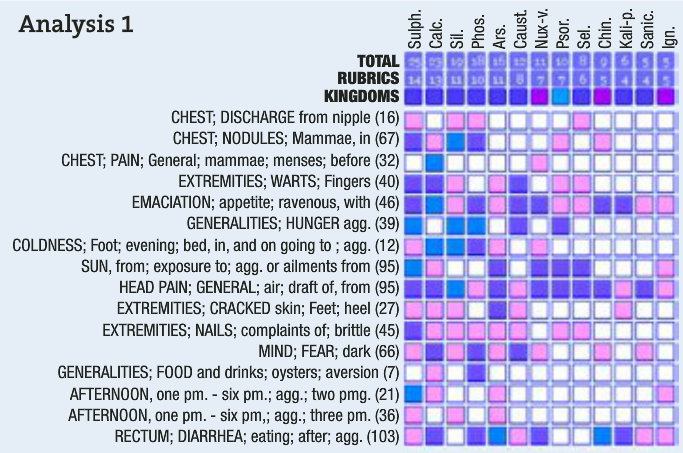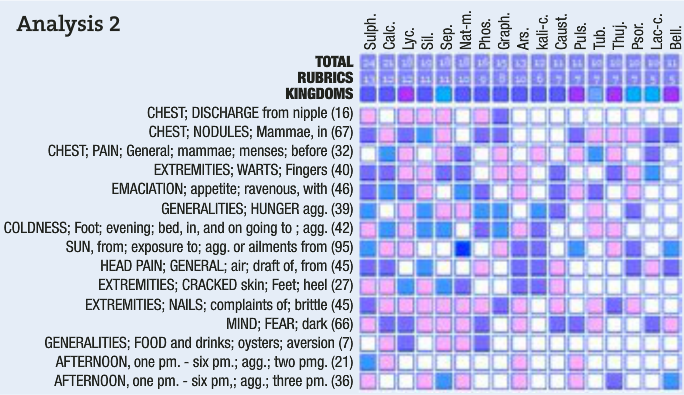Joseph Kellerstein, DC, ND
Rose is a frequent visitor to the office. For some years, she has come in with her kids. Rose is very health conscious and has developed a strong religious foundation to her life. I think her use of spirituality to outreach into the community and be a real light to those less fortunate is so admirable.
Rose has long been aware of homeopathy and prefers its holistic approach over the allopathic approach. Her home is well stocked with dutifully used supplements as well.
What I especially value in Rose is her clearheaded ability to observe purely and simply. I think Hahnemann would have loved to have had her as a prover.
Rose was seen last year with a chief complaint relating to digestion. Breast cysts were a secondary complaint that was soon to be medically examined.
Case Presentation
Rose presents as appearing pleasant, alert, fit, and very slim. She is in her early 40s and has breast and gastrointestinal issues.
About 3 months ago, some long-standing cysts on the left breast that had a history of “needing draining” became more tender. The breast has been discharging a yellow substance. The last draining had been 4 months previously.
Rose stated: “My son is always a challenge.… My number one thing is to be a good mom. The last 2 years, I have let the leash out further.… I have weighed 100 lb forever, and yet I eat the same amount as my husband!… My stools are loose, and it’s huge; it fills the toilet. It’s dark and very, very foul.”
Within 20 minutes of eating or drinking, she will feel a strong and sudden urging at the rectum for stool. Rose is lactose intolerant. There is also a history of warts on the fingers.
For 5 years, Rose has had an annual throat condition and a cough. I had prescribed Rumex, which seems to take care of it quickly.
Also 5 years ago, there was an incident where friends had unjustly accused her of something. The accusation really hurt.
Rose is very conscientious. Getting things done has a high value in her life. She also worries a lot.
She loves to encourage those who need support. Rose would be characterized as “authentic.”
Physically, she is very sensitive to hunger. She is also prone to becoming cold very easily, especially the ankles and feet, and more so in bed at night.
There are headaches from drafts, which is described as a strong sensitivity. Too much sun will also cause headaches.
This last year, Rose has had a tendency to perspire more easily. Her heels crack a lot, and her nails are brittle.
There is an aversion to oysters. She has a mild fear of the dark. Finally, her energy level is worst in the early afternoon, between 1 and 2 pm.
This sounds like quite a stew. What struck me as peculiar throughout about the nature and strength of the symptoms were the inability to gain weight and the headaches that are so sensitive to drafts.
The graph now looks like this:

We would prefer our remedy to be chilly, with a strong tendency to discharges. I chose a single dose of Silica 200 on this basis.
Two Months Later
Within 2 days, Rose’s stool became solid and normal. The smell was gone, as was the strong and sudden urge.
She stated that she has a relapse if she consumes gluten. Breast discharges are still present but are less and less frequent. Although 1 pm is still a downtime, she is less chilly now overall, except for this time!
When she took the remedy, an itch eruption on the leg went away quickly (never discussed previously). It has recently returned.

Teaching Points
Clearly, this case is far from cured. However, it has the following 4 interesting teaching points.
First, the genius of the case really had little to do with the presenting symptoms in a direct way. This emphasizes the need to look at the whole patient and not to simply rely on the pathologic experience.
Second, the case demonstrates the need to consistently question oneself. We have 2 complaints (bowel and breast). One seems well on the way to resolution, while the other (breast discharges) had a less profound response. The discharges are newer than the diarrhea but responded less well. However, it may be argued that the breast cysts are far older than the diarrhea. It is hard for me to have certainty in interpreting Hering’s rule here. If it was a definite case of the older symptom clearing but not the newer symptom, I would question the similitude of the remedy.
Third, it is interesting that the general coldness recedes but regroups itself to the general low time of about 1 pm. This seems to emphasize the importance of that time as a general aggravation for Silica. If this is confirmed more times in future, I would like to upgrade that symptom in the repertory.
Fourth, the relapse of an improved symptom is an indicator for the repetition of the remedy. Although not stated herein, the return of the symptom in this context is an indicator for repetition. I am glad for the opportunity to repeat to test the degree of similitude of the prescription. It is always better to be wrong quickly, so we can get on with being right.
We have thousands of pages of great homeopathic literature gathered over more than 200 years on which to premise our clinical approach in this field. It is a tragedy that some of our naturopathic colleges have allowed the newer approaches with almost no confirmed literature to supervene and cut off the opportunity for students to relate to the roots of this study.
 Joseph Kellerstein, DC, ND graduated as a chiropractor in 1980 and as an ND in 1984. He graduated with a specialty in homeopathy from the Canadian Academy for Homeopathy, and subsequently lectured there for two years. He also lectured in homeopathy for several years at CCNM; for eight years at the Toronto School of Homeopathic Medicine; and for two years at the British Institute for Homeopathy. Dr. Kellerstein’s mission is the exploration of natural medicine in a holistic context, especially homeopathy and facilitating the experience of healing in clients.
Joseph Kellerstein, DC, ND graduated as a chiropractor in 1980 and as an ND in 1984. He graduated with a specialty in homeopathy from the Canadian Academy for Homeopathy, and subsequently lectured there for two years. He also lectured in homeopathy for several years at CCNM; for eight years at the Toronto School of Homeopathic Medicine; and for two years at the British Institute for Homeopathy. Dr. Kellerstein’s mission is the exploration of natural medicine in a holistic context, especially homeopathy and facilitating the experience of healing in clients.

